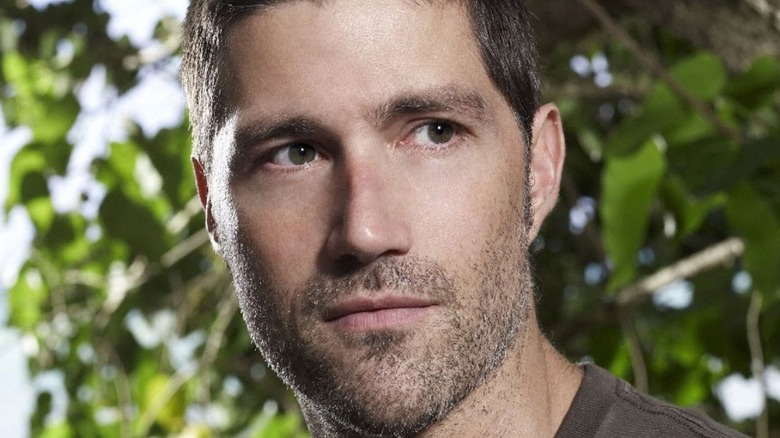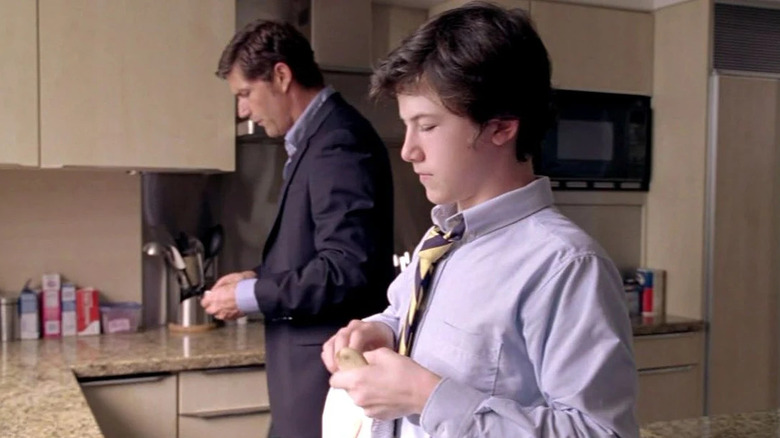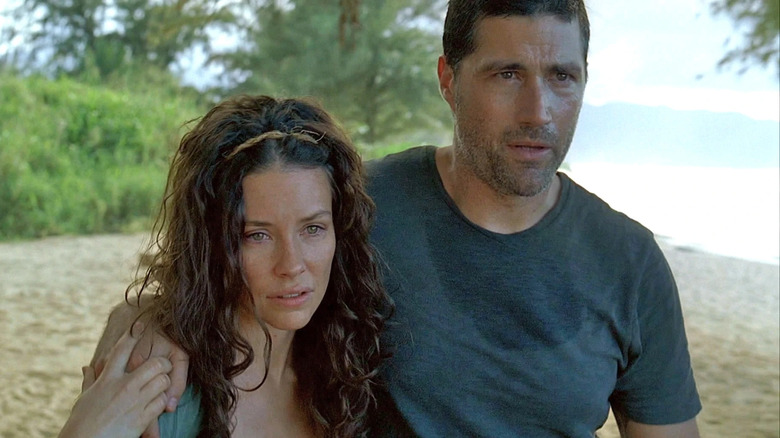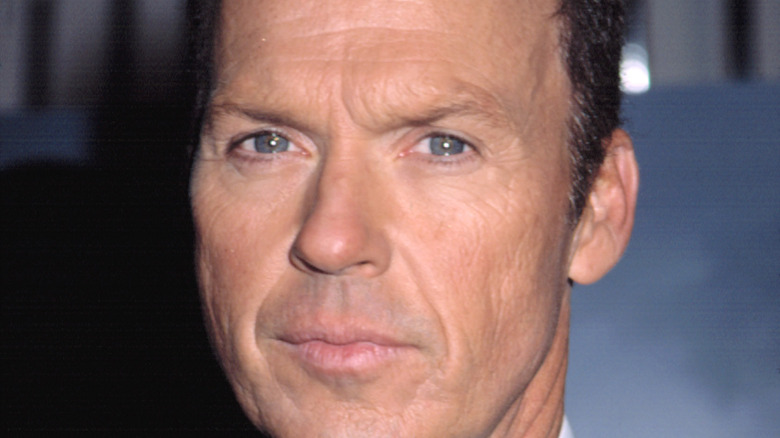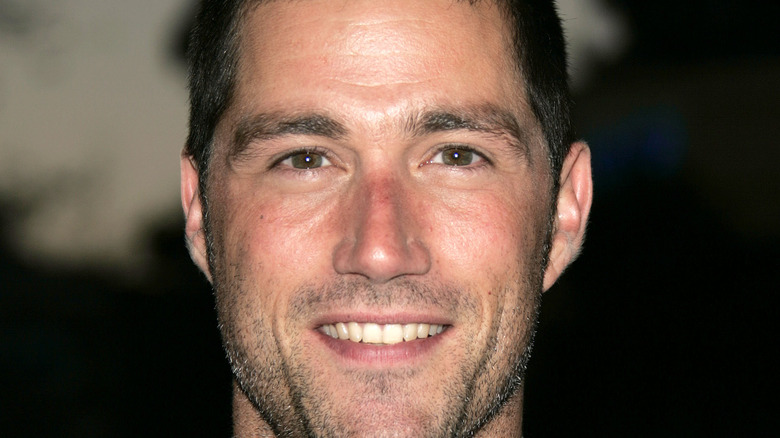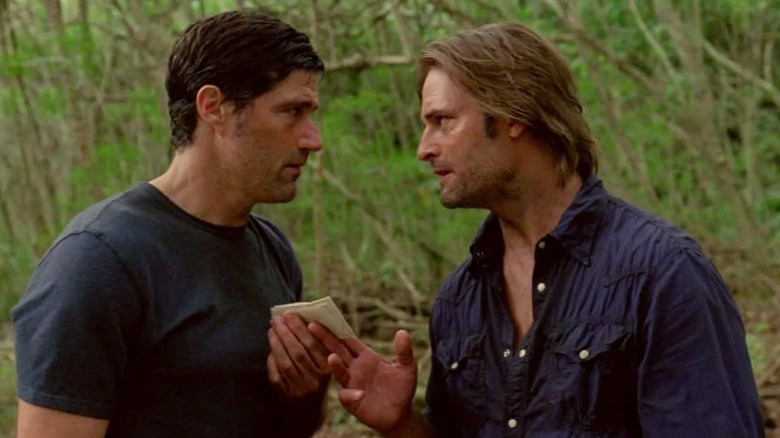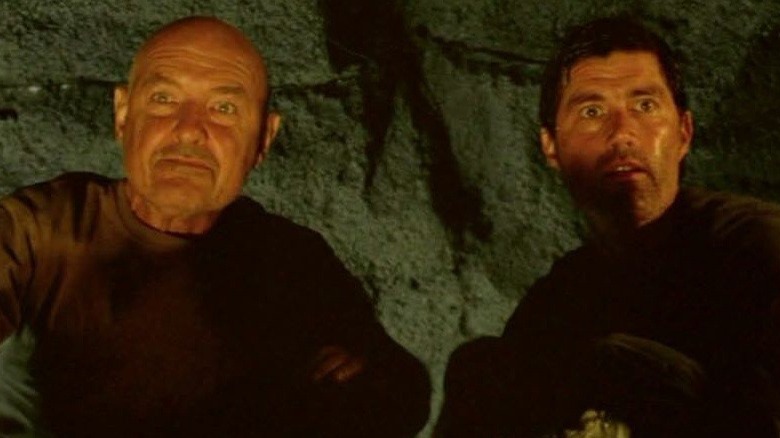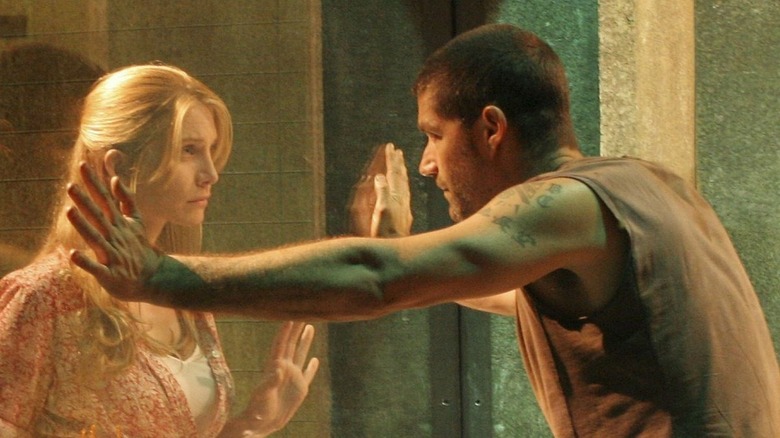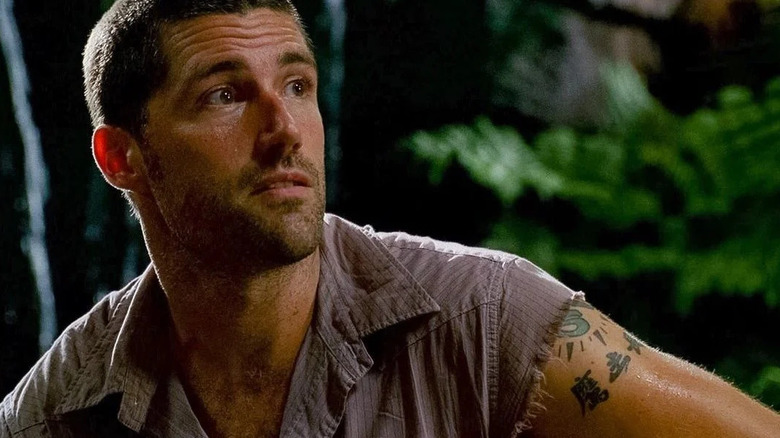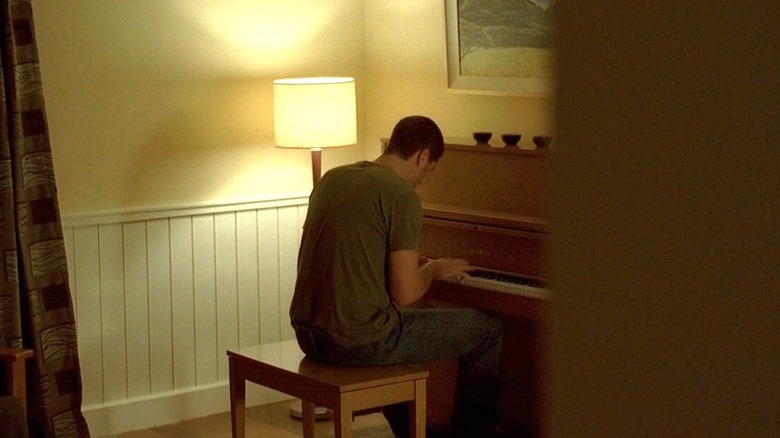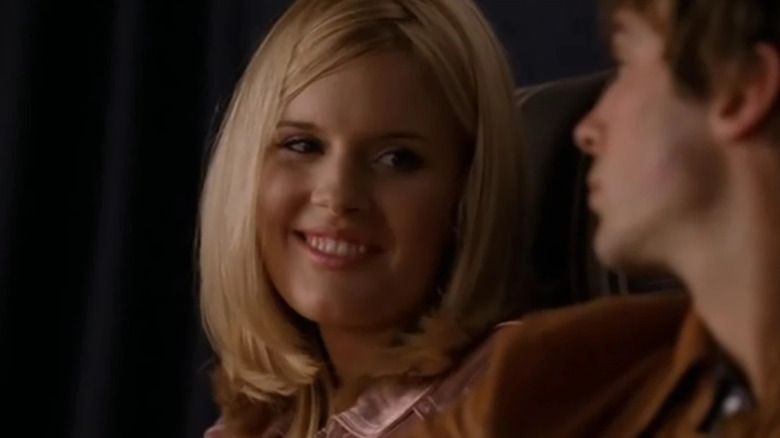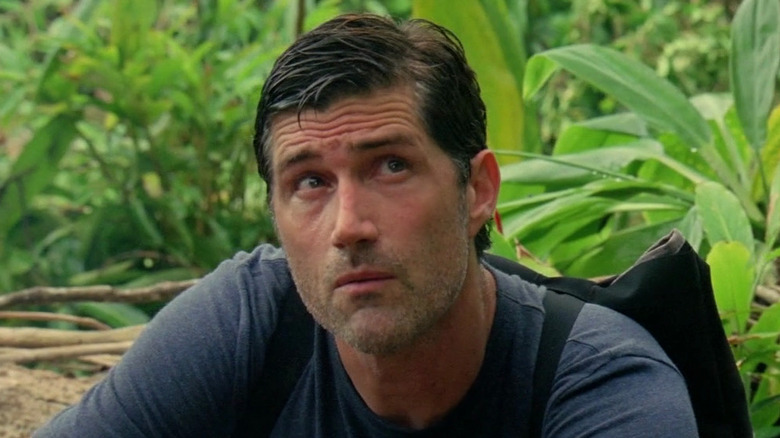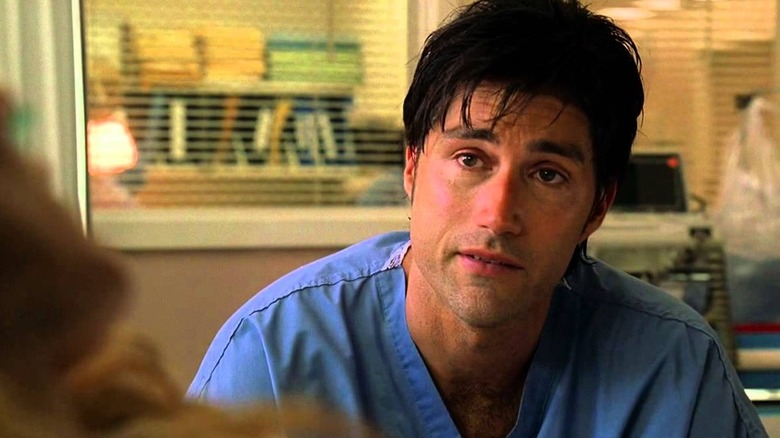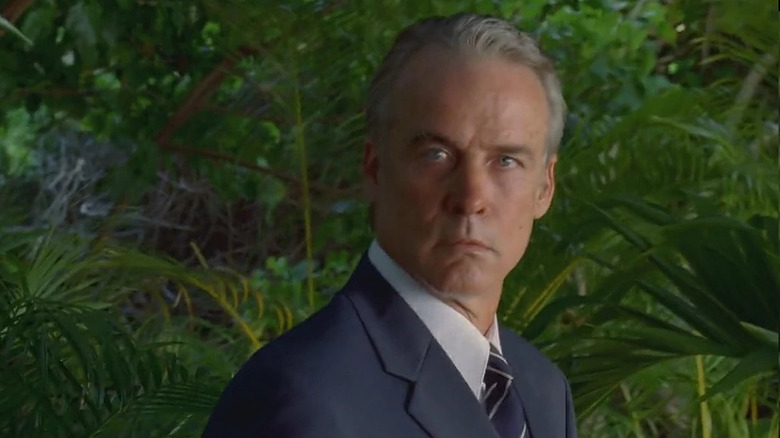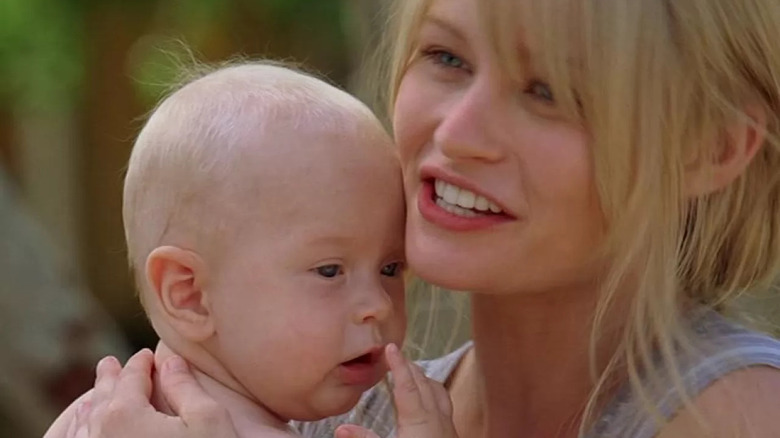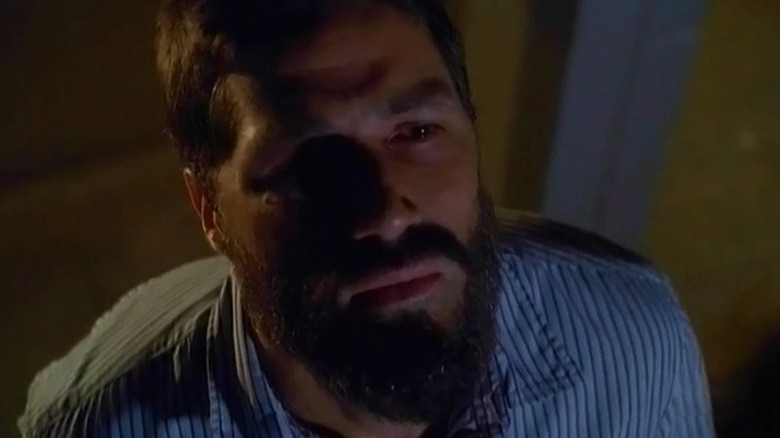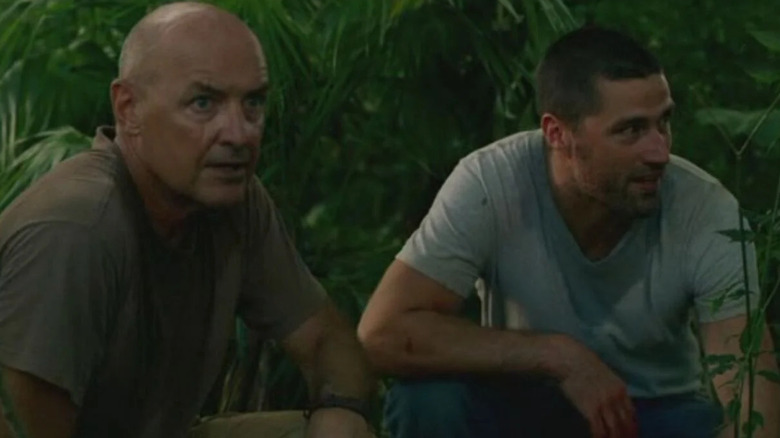The Untold Truth Of Jack Shephard From Lost
Few shows alternate between genuine heartfelt emotion and shocking plot twists quite as well as ABC's "Lost." While the series is famous for building an atmosphere of mystery and balancing a sense of horror, sci-fi, and fantasy throughout its six-season run, "Lost" is also well known for presenting a large cast of memorable characters that fans can relate to and sympathize with. As interesting as certain morally ambiguous figures like John Locke and Benjamin Linus can be, "Lost" also boasts a strong central character in the form of Jack Shephard, the closest thing the series has to a main protagonist.
"Lost" tells the story of a group of plane crash survivors struggling to survive on a remote, uncharted island they assume is somewhere in the Pacific Ocean. Leading this group in their efforts to find rescue is Jack Shephard, a gifted spinal surgeon who acts as the camp's doctor and unofficial leader. Like every character on "Lost," Jack is not without his fair share of troubles, including a tragic relationship with his recently deceased father — an issue that quite literally follows him to his new island settings.
"The ending of "Lost" hit the airwaves over a decade ago, but fans still seem to have many unanswered questions about the show's narrative, as well as the fate of some of the series' main characters, including Jack. Here are some of the most interesting little-known facts about the leader of the Oceanic Flight 815 survivors.
Jack's son in the afterlife reflects his relationship with his own father
Season 6 of "Lost" offers a seemingly alternative timeline of events where Oceanic Flight 815 doesn't crash on the Island. In this timeline, Jack has married and divorced Juliet, and had a son with her named David. As we see from Jack's interactions with David, the two have a distant relationship that is eerily similar to Jack's relationship with his own father, Christian. The two later have an emotional heart to heart where David tells Jack that he's afraid of failing him in some way. Jack tells David how much he means to him, explaining to David that is his father's eyes, David "can never fail."
It's a poignant moment that changes their dynamic, allowing them to grow closer as the season progresses. However, as we later learn, this alternative timeline is actually a purgatory-ish afterlife where each character comes to terms with their lingering unresolved traumas. This reveal implies that David himself is not physically real, but a manifestation of Jack's own personal issues with his father.
As shown in the first half of the season, Jack's interactions with David almost directly mirror Jack's distant relationship with Christian. Both Christian and Jack and, later, Jack and David, share a variety of awkward or tense interactions, with Jack initially failing to engage with David on a more personal level, just as Christian failed to do with Jack previously. However, Jack and David's cathartic moment together serves as a way for Jack to realize the love his own father felt for him — even if he had trouble expressing it — allowing him to forgive Christian and be able to "move on" at the end of the season.
Jack was originally meant to die in the first episode
One of the most surprising things to learn about the original plan for "Lost" is that Jack Shephard was initially slated to die in the very first episode of the series. In the original version of "Lost" that J.J. Abrams, Damon Lindelof, and Carlton Cuse pitched to producers, Jack existed as largely the same sort of character he would turn out to be in the show — a doctor who was the de facto main character of the pilot.
In a shocking twist, however, this version of Jack would die within the last ten minutes of the pilot, meant as a way to surprise viewers and show that any character on the series could die unexpectedly at any moment. With Jack dead, the leadership position of Oceanic Flight 815's survivors would've then fallen to Kate.
Ultimately, the producers requested that the showrunners allow Jack to survive the pilot, as they felt killing the main character off so early in the series might alienate viewers, as reported in an ABC interview with the show's creators. "It wasn't until we delivered the script and we had a meeting in response to the script that certain parties basically said, 'Look, you spent half of the show making us fall in love with this doctor character and then you kill him off,'" said Lindelof. After hearing the feedback from the network and from some trusted parties they gave the script to, Abrams and Lindelof rewrote the first episode, adding the airline pilot that Jack, Kate, and Charlie encounter at the end of the first episode. Instead of following through with the original plan of killing Jack, the unseen Smoke Monster kills the pilot instead.
Michael Keaton was originally going to play Jack
The initial script for the pilot episode of "Lost" had the show's main character, Jack, die abruptly at the end of the episode. If the series had stuck with its original plan, a very different actor might've ended up playing Jack.
While "Lost" was in its earliest stages of development, the showrunners approached Michael Keaton to play Jack. By having such a prominent, easily recognizable actor unexpectedly die onscreen so soon, the showrunners hoped to give the entire series a sense of unpredictably when it came to fan expectations. According to an interview with The Hollywood Reporter's "Awards Chatter" podcast, Keaton was more than happy to appear as Jack in "Lost" when it wouldn't require him to commit to an entire show — something he wasn't sure he was ready to do.
On the podcast, Keaton said, "['Lost' co-creator J.J. Abrams] said, 'Here's what happens: the guy that you think is the lead dies in the last ten minutes,' and I immediately — when I hear things like that ... those type of things intrigue me. And I thought, 'Yeah!' The idea of doing an hour television show ... I'm just too lazy. So I thought, 'Wow, this is pretty good! Then I don't have to be in the series!'"
When the showrunners changed their mind and rewrote the episode so that Jack survives, Keaton pulled away from the project, deciding he wasn't quite willing to do an entire series.
Matthew Fox initially tried out for Sawyer
In an interesting turn of events, the actor who ended up playing Jack didn't initially try out for the leading man gig in "Lost." In fact, like fellow cast members Dominic Monaghan and Jorge Garcia, Fox originally auditioned for the role of Sawyer. In the early stages of "Lost," Sawyer was meant to appear more as a suit-wearing professional con man from Buffalo, New York, with Forest Whitaker apparently even being eyed for the role (via The Daily News). When Josh Holloway reportedly forgot a line during his audition for the part, he kicked a chair and loudly cursed before resuming his reading, demonstrating an intensity and unpredictability the showrunners loved and wanted for Sawyer, as reported in Orange Coast Magazine. The part was then rewritten to accommodate Holloway's Southern background, and the role given to Holloway as a result, as revealed in the featurette "Before They Were Lost" from the DVD release of the first season of "Lost."
At the time of Fox's audition for Sawyer, very few characters on the show had been fully developed. After Jack was created as the show's main character and Michael Keaton turned down the job, the showrunners — remembering Fox's impressive audition — decided to cast him in the part. Judging from the audition tapes themselves, the decision was an excellent one, with Fox managing to inject enough emotion and warmth into his portrayal of Jack to establish him as a natural leader of the survivors. Fox's take on an early incarnation of Sawyer is interesting, but "Lost" wouldn't be "Lost" without Josh Holloway as the charming antihero.
Jack appears in almost every episode
It can be argued that "Lost" doesn't really have a central main character. After all, each episode of the series frames its narrative around a different specific character, allowing for the show to cycle through a range of individual viewpoints. However, if there is one character the series returns to again and again and focuses on the most, that character would obviously be Jack. Not only does the show open and close with episodes built around his perspective, but Jack also appears in the more "Lost" episodes than any other character.
Out of the 119 episodes that make up "Lost," Jack appears in 113 of them, sometimes in a minor role, but more often than not having a prominent presence on screen. Jack also has the largest number of episodes focused on him specifically, with a total of 12 "Lost" episodes being "Jack-centric," meaning Jack is the focus on the episode's flashbacks, flash-forwards, or flash-sideways.
Additionally, Jack encounters more characters than anyone else on "Lost," making him a link connecting individuals impacted by the events of the story. That's true to a lesser degree for many other characters, however nobody on "Lost" meets more major or supporting characters than Jack. For instance, Sun and Sayid never meet Dr. Chang, Hurley never meets Eloise, and Sawyer never meets Illana, but Jack meets all of those folks at some point.
Jack's name is a reference to his leadership and his connection to Locke
The creators of "Lost" snuck in a number of references and double meanings in their characters' names. Often, these references can be a bit on the nose, like using the names of famous philosophers for philosophical characters like John Locke, for instance. Other times, these meanings are a little less obvious.
Jack's last name, Shephard, seems to convey his status as the leader of the Oceanic Flight 815 survivors, similar to the role a shepherd plays when leading their flock. Jack's first name, just like Locke's first name, is a commonly shortened version of Johnathan. Perhaps this was deliberate connection made by the showrunners to emphasize the juxtaposition between Jack and Locke and their conflicting worldviews.
Though complete opposites in many ways, Locke and Jack share a begrudgingly mutual respect. Additionally, Locke also takes on several leadership roles in the later seasons of "Lost." He offers to lead the Oceanic Flight 815 survivors who want to split off from Jack and stay on the Island, and briefly leads the Others, inviting even more comparisons between himself and Jack.
Jack's name might also be a deliberate allusion to the classic novel, "Lord of the Flies," a book that follows a group of plane crash survivors living on a deserted island. "Lord of the Flies" also includes a character named Jack who becomes one of the survivors' main leaders.
All of the Jack-centric episodes in Season 3 are literary titles
Along with the large number of connections that exists between nearly every main character on "Lost," the series' showrunners also weave in loads of literary references. Some of these references are very unsubtle. In fact, certain episodes' titles are taken directly from well-known works of literature.
This happens to be the case for all of the Jack-centric episodes in Season 3. The title of the season's premiere episode, "A Tale of Two Cities," references Charles Dickens' novel about the French Revolution as well as the fact that the true nature of the Others is revealed during the course of the episode. The second Jack-centric episode of the season shares its title with the Robert A. Heinlein novel "Stranger in a Strange Land," which follows a human raised on Mars by aliens, paralleling Jack's outsider status with the Others.
The final episode of the season, "Through the Looking Glass," takes its name from the Lewis Carroll book of the same name — a sequel to Carroll's timeless classic, "Alice in Wonderland." In "Through the Looking Glass," Alice enters a world where everything is reversed. The name of the episode is both an allusion to the DHARMA Initiative station, the Looking Glass, as well as Jack's own situation in his flash-forward storyline. The most significant structural reversal in the Season 3 finale is the introduction of flashforwards, which replace the flashbacks the show has used to frame its stories up until this point. The reversal aspect might also signify Jack's changing viewpoint on the Island, as he begins the episode actively trying to escape, only to reverse his views in the future, famously shouting at Kate, "We have to go back!"
Matthew Fox's tattoos inspired a Jack-centric episode
In an interesting bit of trivia, the several tattoos we see on Jack's body are in reality Matthew Fox's own personal tattoos, not the work of a makeup artist. Several characters comment on the tattoos throughout the show, usually pointing out how surprising it is to see a straightlaced doctor with such prominent ink on their body. Initially, the showrunners planned using makeup to cover the tattoos, but decided against it, and started planning to elaborate on the meaning behind the tattoos as well as how Jack came to get them in the first place.
As we see in Jack's flashback in the Season 3 episode "Stranger in a Strange Land," Jack travels to Phuket, Thailand, and engages in a romantic relationship with a mysterious young woman named Achara. As they spend more time together, Achara reveals to Jack that she has a rare "gift" that allows her to see who people really are, and designs tattoos that reveal their inner nature. When Jack asks her what kind of man he is, Achara tells him, "You are a leader, a great man. But this, this makes you lonely, and frightened, and angry." While she refuses at first, Achara eventually gives Jack the tattoo we see in the present.
In the context of the show, the literal translation of Jack's tattoo differs from what it actually says in real life. In the show, Isabel translates it as "He walks among us, but he is not one of us." This is meant as a reference to Jack feeling insecure about his leadership potential. However, the actual translation of Matthew Fox's tattoo is roughly, "Eagles high up cleaving the sky" — a line taken from a 1925 Chinese poem written by Chairman Mao Zedong, according to Northeastern University's Xinping Zhu.
Jack is the only character to play his own theme song
Several times throughout "Lost," viewers can spot Jack skillfully playing the piano. This is a hobby of Jack's we see a number of times in "Lost," and seems to be shared by his son David in the flash-sideways timeline. Perhaps the clearest example of Jack's musical talents comes in the Season 3 episode "The Man from Tallahassee" when Sayid, Kate, and Locke try to rescue Jack from the Others' captivity.
The scene in question finds Kate sneaking into one of the former DHARMA Initiative houses where Jack is being kept under surveillance. As she quietly enters the house from the backdoor, she finds Jack seated in the living room playing a mournful tune on the piano before realizing Kate is behind him. In this scene, Jack is really playing his own theme song, penned by the "Lost" musical director, Michael Giacchino.
The song is called "A Touching Moment," and is usually performed by an orchestra. It heavily features a solo cello, a quiet harp, and a gentle piano accompaniment nearly every time it's played in the background of a scene. Uniquely, Jack is the only character to play his own theme song in the entirety of "Lost."
Jack nearly saved Shannon's father's life
"Lost" is well known for the variety of connections that exist between characters before their arrival to the Island. Hurley owed the box manufacturing company where Locke worked. Jack's father, Christian, convinces Sawyer to kill the man he believes is responsible for his parents' death when they happen to meet in Australia. Practically every single main character on "Lost" has some sort of thread that ties them into another character's backstory in some way, shape, or form.
When it comes to Jack, one of the most significant connections he has is to his fellow Oceanic 815 survivor Shannon Rutherford. Years before her arrival to the Island, Shannon's father Adam was involved in an accident after his SUV collided with a car driven by Sarah Wagner. As depicted in Season 2's opening episode, "Man of Science, Man of Faith," both individuals are severely injured and taken to the emergency room at St. Sebastian Hospital where Jack is working at the time. Jack makes a split-second decision to focus his efforts on Sarah and lets his staff tend to Adam. Moments after, Adam succumbs to his injuries.
Jack's decision to save Sarah instead of Shannon's father impacts both characters' lives. As we see in each of their arcs, Shannon ends up losing her fortune when her stepmother inherits all of Adam's vast wealth. Meanwhile, Jack would perform a miraculous surgery on Sarah, saving her life and leading to her full recovery. The two later fell in love and were briefly married, though later divorced due to Jack's commitment to his job.
Jack is one of the only people whose health deteriorates on the Island
One of the most mysterious elements the Island possesses is its unique ability to rapidly heal injuries and other health-related issues. When they arrive on the Island, the paralyzed Locke instantly regains the full use of his legs; Rose's terminal cancer vanishes; though previously considered sterile, Jin can impregnate Sun without any issues.
While many characters' health improves on the Island, that's not necessarily the case for everyone. In Season 4, Jack is afflicted with appendicitis, rendering him temporarily bedridden and the subject of impassionate Island drama when he announces his intention to oversee the procedure on himself, talking Juliet through the surgery with the assistance of Bernard and Kate. The other notable person who gets sick is Ben Linus, the leader of the Others, who is diagnosed with a spinal tumor before Oceanic Flight 815 crashes.
It might be mere coincidence that Jack and Ben are the only two characters whose health worsens on the Island, but it might also have been a deliberate plotline the showrunners introduced to invite further parallels between Jack and Ben. Both Jack and Ben are the respective leaders of their camps, with both of their maladies threatening their lives. Each illness requires an emergency operation to correct. Jack and Ben are both temporarily left in weakened states but make relatively speedy recoveries.
Jack's number comes up a few times in the show
A recurring motif on "Lost" is the inclusion of the enigmatic numbers — 4, 8, 15, 16, 23, and 42 — that pop up again and again during the series. The unanswered questions surrounding what these numbers mean and why they keep showing up comprise one of the earliest mysteries of "Lost." Later, it's revealed by the Man in Black that the numbers actually correlate to candidates Jacob has in mind to succeed him as protector the Island, with each number associated with a specific candidate.
According to the cave wall where Jacob wrote down all his candidates and his corresponding numbers, Jack's number is 23. Like the other numbers, this particular number shows up a few times during the course of "Lost," sometimes directly related to Jack himself. On Oceanic Flight 815 shortly before the crash, you can briefly spot the fact that Jack is seated in row 23 during the moment when Charlie runs past him. Quite a while later when Jack is trying to resuscitate Charlie after he is hanged by Ethan, Jack hits Charlie's chest 23 times before Kate tells him to stop. In the series finale, Jack's family is seated at table 23 while attending the concert featuring Daniel Widmore and Driveshaft. Jack shows up late, but table 23 also happens to be where his ex-fiancé Kate and his half-sister Claire run into each other for the second time in the Sideways-verse
The number 23 has some religious significance as well. In the Book of Psalms, the 23rd Psalm begins with the line, "The Lord is my shepherd, I shall not want" — an interesting connection between the number 23 and Jack's last name.
Jack follows in his father's footsteps in more ways than one
Jack's troubled relationship with his father is one of his main arcs. Having been raised from a young age to follow in his father's footsteps, Jack spends most of his life believing he would never live up to his father's aspirations. Later in life, the tables turn and Jack lashes out at Christian for his obvious flaws, particularly his excessive drinking, which directly contributes to their falling out and Christian fleeing to Australia.
Jack probably doesn't like the idea of growing up to be just like his father. When he realizes how emotionally distant he is from his son, David, Jack immediately sets about working to correct the issue and forms a bond with his son that he never had with his own father. On the other hand, there's a different period of time where Jack does, in fact, mimic his father's most destructive behaviors. When Jack returns to the real world in Season 4, he begins heavily drinking and abusing drugs, indicating that he's inherited his father's substance abuse tendencies.
Jack is Aaron's half-uncle
One of the biggest reveals about Jack's past is that his father, Christian, had a child via an extramarital affair in Australia. Christian's other child would be named Claire, and — years later — would be one of the many passengers onboard Oceanic Flight 815 when it crashed onto the Island. Though the two are half-siblings and share numerous interactions after the crash, Jack and Claire never formally realize that they are related during their time together. That information only becomes known to Jack after he's made it off the Island and returned to Los Angeles, where Claire's mother informs him that Christian had another child out of wedlock with her.
Despite not knowing Claire is his half-sister while they're both on the Island, Jack still goes to extra lengths to care for Claire and ensure she delivers her baby safely. After Aaron is born, Jack regularly tends to the two to make sure they're doing okay. When Claire abruptly disappears halfway through Season 4, Kate ends up looking after Aaron, and Jack and Kate are two of the six Oceanic 815 passengers to make it off the Island. After returning to the ordinary world, Jack and Kate enter a romantic relationship and act as surrogate parents for Aaron.
It's easy to forget that Jack is actually Aaron's uncle, but it is still interesting to note that whenever we see Jack caring for Aaron in Season 4, he does so both as a surrogate father and an actual uncle to the boy, even if he doesn't initially realize it.
Jack's ultimate fear is failure
Just as every main character on "Lost'" has their own unique backstory, each character also combats their individual feelings of inadequacy and their tragic pasts. John Locke has issues with his father that make Jack and Christian's relationship look ideal in comparison; Sayid and Sawyer both struggle with guilt and shame due to their careers as a torturer and a con man, respectively; Desmond thinks of himself as a coward due to the fear of commitment that undercut some of his choices during his younger days.
Jack, like everyone else on "Lost," has his share of baggage. Jack reluctantly accepts the leadership role his fellow survivors thrust upon him, but the position of de facto authority does nothing to boost his ego. Instead, it enhances Jack's overestimation of his scope of personal responsibility, as well as his inability to forgive himself for mistakes, even when they pertain to events far beyond his control.
It's almost certain that Jack's fear of failure stems from his relationship with his dad and the pressure he felt growing up to live up to his father's high expectations. In a flashback from the Season 1 episode, "White Rabbit," Christian has a one-on-one discussion with Jack where he advises his son against acting like a hero, telling the boy that "he doesn't have what it takes" to cope with the inevitable failure he'll face. As an act of rebellion and an attempt to prove that he does have what it takes to be a hero, Jack grows up trying to save everyone he can. Unsurprisingly, when he does meet with failure, he takes it harder than he should.
Jack and Locke switch viewpoints in the final season
Jack Shephard and John Locke have the most storied rivalry in all of "Lost." Polar opposites in every way, Jack prides himself on being a man of science who relies on logic and rational explanations. Locke, on the other hand, views himself as a man of faith who is willing to give into superstition, believe in the supernatural, and rely heavily on the ideas destiny and fate to justify actions in his life.
A main point of contention between Jack and Locke is fate versus coincidence, with Locke believing he and his fellow castaways were brought to the Island for a reason and that they aren't meant to leave. While Jack does everything he can to try and get off the Island, Locke actively tries to thwart his efforts, sabotaging any attempts Jack makes when it comes to trying to get back to the real world.
By the final season of "Lost," we see Jack has completely reversed his position on the Island, adopting many of Locke's principles and philosophies for himself. When Jack returns to the Island, just as Locke asks him to do during his brief excursion to the ordinary world under the codename "Jeremy Bentham," Jack comes into conflict with the Man in Black, who has taken Locke's physical form. Ironically, Locke and Jack's conversations and viewpoints in this final season serve as a reversal of the real Locke and Jack's arguments earlier in "Lost." Whereas Locke prevents Jack from leaving the Island in the first few seasons, this new version of Jack tries to stop the Man in Black from leaving, now sharing the real Locke's belief that it was their destiny to arrive on the Island in the first place.
